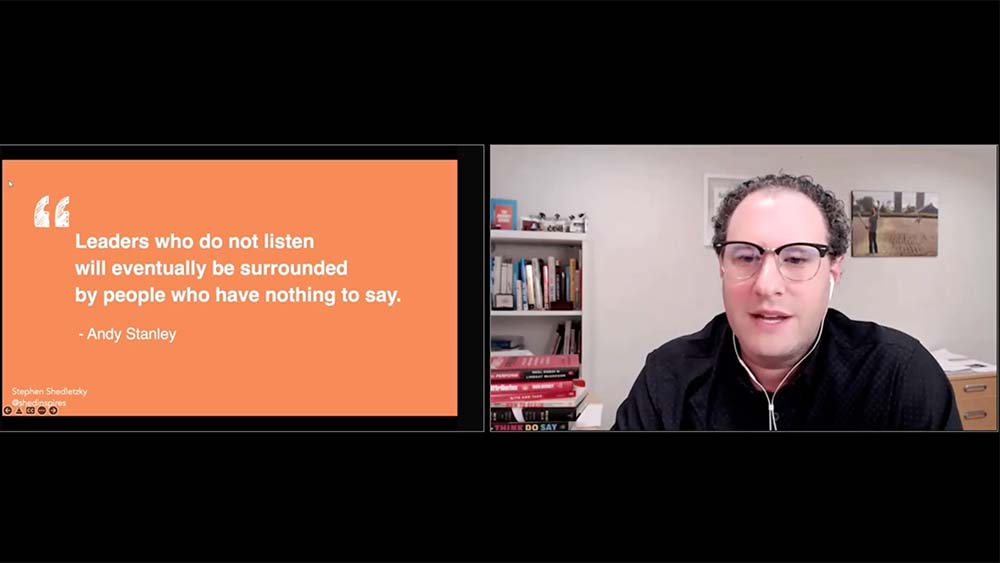
The two building blocks of a speak-up work culture are encouragement and reward, Stephen Shedletzky said in his Convening Leaders 2022 session.
How can organizations create an environment where employees feel empowered to provide valuable feedback? According to Stephen Shedletzky, who presented the Convening Leaders 2022 session “How to Create a Healthy Speak-Up and Feedback-Rich Culture,” it starts with fostering a sense of psychological safety. That, said Shedletzky, an executive coach and advisor on leadership, behavior, and culture, is key to building a culture in which professionals feel they can have tough conversations with their peers — and freely share ideas and concerns with their superiors without fear of ridicule and retribution.
“Candor with care,” Shedletzky said, “is what I like to call it. If you have a conversation about business and you don’t talk about relationships or people, I have news for you, you don’t understand business,” Shedletzky said. “And for those who say, ‘Oh it’s not personal, it’s business’ — no. Business is personal.”
The two building blocks of a speak-up culture are encouragement and reward, Shedletzky said. The reason employees choose to speak up about something important is because they’re encouraged to do so, he said. They need to know that their organization wants to hear their feedback “and that it will do more good than harm.” If employees are made to feel their voice doesn’t matter to their team, they become apathetic or, in extreme cases where they feel their ethical concerns are being ignored, they become a whistleblower within their organization.
Watch the Session
Convening Leaders 2022 attendees, don’t miss your chance to peek behind-the-scenes in our MashUp Studios, or re-watch the Main Stage and other sessions in JUNO’s CL22 Library. On-demand access to CL22 content is available through March 12, 2022.
If employees are encouraged to speak up and are then rewarded, Shedletzky said, they’re likely to follow through. “Which doesn’t mean we make people right,” he said. “It means we say, ‘Thank you. Tell me more.’ ‘Oh, that’s a good point, I haven’t thought about that.’ ‘Oh, that’s not going to work but let’s talk about why.’ So long as speaking up is rewarded, people will keep doing it. As soon as you ignore repeatedly or punish, all of a sudden,” he said, people stop talking.
Once professionals become accustomed to being encouraged and rewarded for speaking up, a regular ritual of mutual feedback will form organically, Shedletzky said.
“Feedback is the input that gets us the output of better relationships,” he said. In order to provide the most constructive feedback, professionals should consider “FBI,” which stands for feeling, behavior, impact.
“It works for both positive and constructive feedback,” Shedletzky said. For example, instead of accusing someone who reports to you of being irresponsible when they showed up late to client meetings, Shedletzky suggested approaching it this way: “‘I’m not sure I can trust you with what’s on your plate. What’s going on? Are you okay? This isn’t you,’” he said. “Feedback is essential. As leaders, as anyone, we need to be mindful of how often we’re dishing it out and receiving it.”
Casey Gale is associate editor at Convene.
